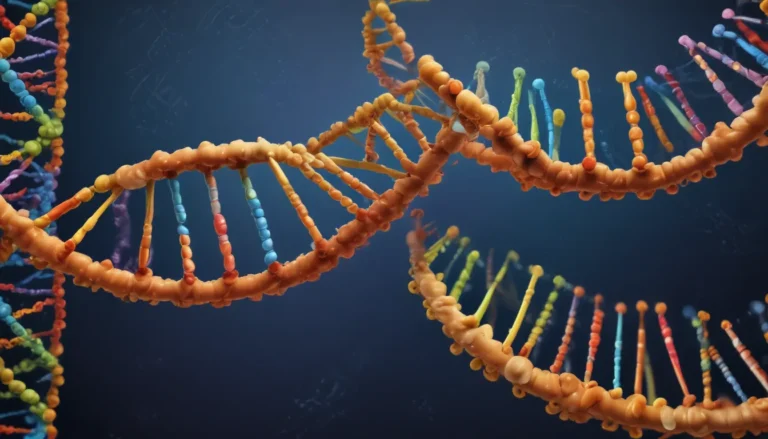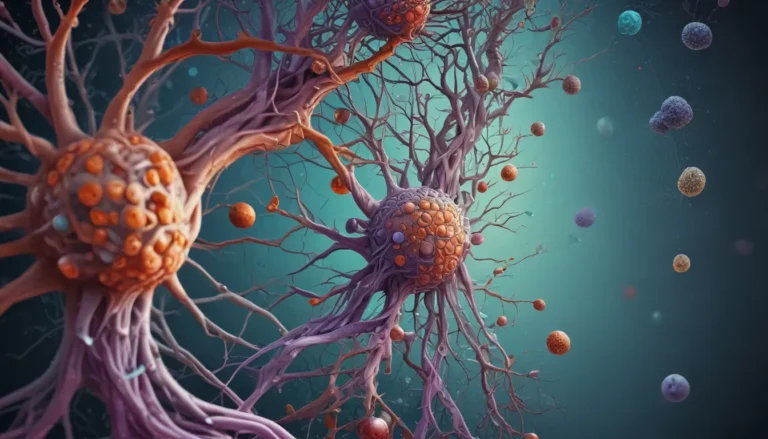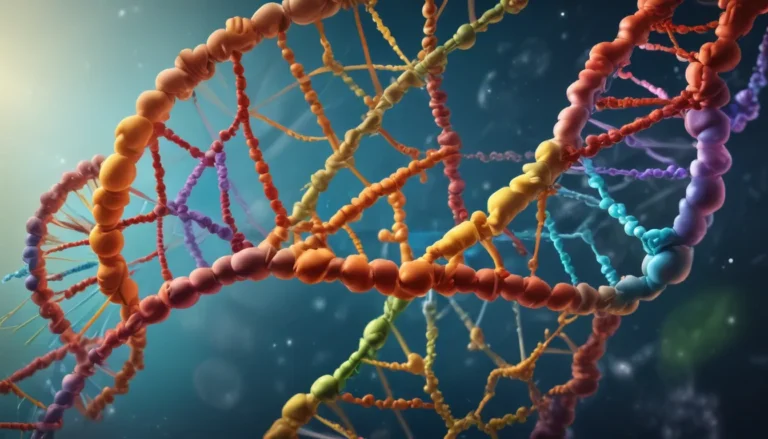A Note About Images: The images used in our articles are for illustration purposes only and may not exactly match the content. They are meant to engage readers, but the text should be relied upon for accurate information.
Proteomics, a captivating field within molecular biology, takes us on a journey through the intricate world of proteins, unveiling their structures, functions, and interactions within living organisms. As an essential branch of biological research, proteomics sheds light on the critical role proteins play in governing life processes. From enabling cellular functions to regulating gene expression, proteins are the building blocks of life that continue to amaze scientists and researchers alike.
Understanding the Marvels of Proteomics
Proteomics, the study of proteins and their functions, serves as a cornerstone in biological research, offering valuable insights into various aspects of life sciences. Through proteomics, researchers aim to decode the complex network of proteins that drive essential biological processes, paving the way for advancements in medicine, agriculture, and biotechnology.
Unraveling the Role of Proteomics in Disease Understanding
By delving into the proteins present in different diseases, proteomics has revolutionized disease diagnosis, prognosis, and treatment. Through the identification of potential biomarkers, proteomics has deepened our understanding of complex diseases like cancer, Alzheimer’s, and diabetes, offering new avenues for improved therapeutic interventions.
The Power of Mass Spectrometry in Proteomics Research
Mass spectrometry, a powerful analytical technique, lies at the heart of proteomics research, enabling the identification and quantification of proteins. By analyzing the mass-to-charge ratio of protein fragments, researchers gain valuable insights into protein structure and composition, further advancing our knowledge of the proteome.
Pioneering Protein-Based Therapies Through Proteomics
Proteomics research has led to the development of protein-based drugs that target specific disease pathways, opening up new possibilities in personalized medicine and treatment options. These advancements highlight the transformative potential of proteomics in revolutionizing therapeutic modalities.
The Human Proteome Project: Mapping the Proteins of the Human Body
The Human Proteome Project, a global initiative, seeks to identify and characterize all proteins encoded by the human genome. This ambitious endeavor aims to provide a comprehensive understanding of human biology and disease, paving the way for groundbreaking discoveries in the realm of proteomics.
Enhancing Crop Yields and Ensuring Food Security Through Proteomics
By studying plant proteins involved in growth, development, and stress responses, proteomics offers insights into breeding crops with increased resilience to diseases, pests, and environmental conditions. This research holds immense potential for enhancing agricultural productivity and addressing global food security challenges.
Exploring Post-Translational Modifications Through Proteomics
Proteomics enables the identification and characterization of post-translational modifications, chemical changes that occur after protein synthesis. These modifications play a critical role in regulating protein activity, stability, and function, offering a nuanced understanding of cellular processes.
Shedding Light on Protein-Protein Interactions Through Proteomics
Through advanced techniques like protein-protein interaction networks, proteomics allows researchers to explore and study complex interactions between proteins. This knowledge provides valuable insights into cellular processes and signaling pathways, deepening our understanding of biological systems.
Customizing Medicine Through Proteomics
Personalized medicine leverages proteomics data to tailor treatments based on individual protein profiles, optimizing therapy selection, dosage, and reducing adverse drug reactions. This precision approach marks a significant advancement in healthcare, emphasizing the role of proteomics in improving patient outcomes.
Unveiling New Drug Targets Through Proteomics
By identifying proteins involved in disease progression, proteomics aids in discovering novel drug targets for therapeutic development. This innovative approach holds the promise of developing more effective and targeted therapies, shaping the future of medical interventions.
Deciphering Protein Dynamics Through Proteomics
Proteomics techniques enable the study of protein turnover, synthesis rates, and degradation, offering insights into protein stability and regulation within cellular environments. By unraveling protein dynamics, proteomics contributes to a comprehensive understanding of cellular processes.
Illuminating the Mysteries of Aging Through Proteomics
Through the study of changes in protein expression and modifications during the aging process, proteomics sheds light on the underlying mechanisms of aging and age-related diseases. This knowledge paves the way for potential interventions to promote healthy aging and longevity.
Embracing Proteomics in Forensic Science
Proteomics techniques find applications in forensic science, enabling the analysis of biological samples at crime scenes for vital information in identifying individuals or determining the cause of death. Proteomics contributes to forensic investigations by offering valuable insights through protein analysis.
Mapping Protein Localization Within Cells Using Proteomics
Through techniques like immunofluorescence and subcellular fractionation, proteomics facilitates the identification and mapping of proteins within different cellular compartments. This mapping contributes to a better understanding of cellular processes and protein distribution within cells.
Revolutionizing Neurodegenerative Disease Research Through Proteomics
Proteomics research unveils the proteins implicated in neurodegenerative diseases like Parkinson’s and Alzheimer’s, offering new avenues for targeted therapies and early diagnostic tools. By advancing our understanding of disease mechanisms, proteomics plays a vital role in combating neurodegenerative conditions.
Accelerating Drug Discovery Through Proteomics
Proteomics expedites drug discovery by screening compounds against specific protein targets, identifying potential drug candidates more efficiently. This accelerated process streamlines drug development efforts, reducing costs and fostering innovations in therapeutic research.
Tailoring Cancer Treatments Through Proteomics
Analysis of cancer samples using proteomics reveals distinct protein expression patterns in different cancer subtypes, enhancing our understanding of cancer biology. This knowledge could lead to personalized treatment approaches tailored to specific cancer subtypes, marking a significant advancement in oncology.
Unveiling Immune System Insights Through Proteomics
Proteomics offers new insights into immune cell signaling, antigen presentation, and immune response mechanisms, deepening our understanding of the immune system. These findings pave the way for the development of novel immunotherapies and vaccines, shaping the future of immune-related research.
Embracing Precision Medicine Through Proteomics
By integrating proteomics data with genomics and clinical information, precision medicine aims to personalize treatment regimens for individual patients. This tailored approach enhances patient outcomes and healthcare efficiency, underlining the transformative potential of proteomics in improving personalized medicine.
Embracing the Realm of Proteomics: Pioneering Advancements in Biotechnology
In conclusion, proteomics stands as a pioneering field with the potential to unlock new insights into biological systems and revolutionize various sectors, from medicine to agriculture. The 19 fascinating facts about proteomics presented in this article showcase the remarkable discoveries and advancements in this dynamic field. As researchers continue to push the boundaries through innovative technologies and methodologies, proteomics will play a pivotal role in shaping the future of scientific inquiry and biological research.
Exploring Frequently Asked Questions on Proteomics
-
What is proteomics?
Proteomics is the study of proteins, encompassing their structure, function, and interactions within biological systems. -
How does proteomics differ from genomics?
While genomics focuses on an organism’s entire genome, proteomics specifically delves into the complete set of proteins present in a given biological sample. -
Which techniques are utilized in proteomics?
Proteomics employs diverse techniques such as mass spectrometry, protein microarrays, and two-dimensional gel electrophoresis for protein analysis and identification. -
What role does proteomics play in medicine?
Proteomics plays a crucial role in medicine by identifying disease biomarkers, developing targeted therapies, and facilitating personalized medicine approaches. -
Can proteomics contribute to agriculture?
Yes, proteomics aids in enhancing crop yields, studying plant-pathogen interactions, and developing genetically modified crops with desired traits to bolster agricultural productivity. -
How does proteomics impact drug discovery?
Proteomics enables the identification of drug targets, validation of therapies, and assessment of drug efficacy and safety, fostering advancements in drug discovery efforts. -
Are there ethical considerations associated with proteomics?
While proteomics research is ethically neutral, ethical concerns may arise regarding human sample handling, data privacy, and animal research practices in proteomics studies. -
In what ways is proteomics utilized in forensic science?
Proteomics is employed in forensic science for the identification of bodily fluids, DNA profiling, and determining the time of death, offering valuable insights for forensic investigations. -
Can proteomics study protein dynamics?
Yes, proteomics provides insights into protein expression levels, modifications, and interactions, facilitating the study of protein dynamics in various biological processes. -
What does the future hold for proteomics?
The future of proteomics holds vast potential for advancements in personalized medicine, biomarker discovery, and a deeper understanding of complex biological systems, showcasing an exciting trajectory for proteomics research.
As you delve deeper into the realm of proteomics, consider exploring additional captivating fields such as proteome analysis and bioinformatics, each offering a wealth of fascinating facts waiting to be revealed. Let your curiosity guide you as you uncover the wonders of these cutting-edge disciplines, expanding your knowledge and appreciation for the marvels of scientific exploration.
Conclusion
From unraveling disease mechanisms to advancing drug discovery and personalized medicine, proteomics continues to stand at the forefront of scientific innovation, shaping the landscape of biological research. As we journey through the vast expanse of protein exploration, the possibilities within proteomics are boundless, promising transformative breakthroughs in various sectors. With a steadfast commitment to quality and authenticity, proteomics remains a beacon of knowledge, enlightening us with each new discovery and propelling us toward a future where scientific inquiry knows no bounds.






